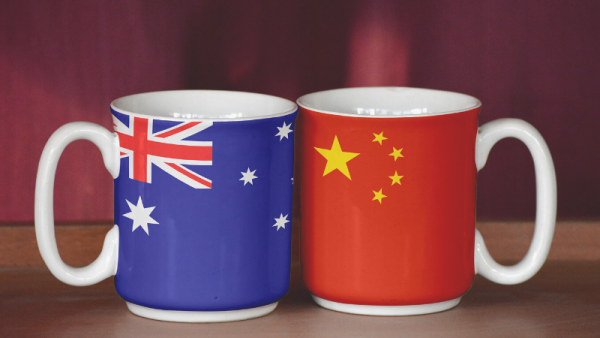Aritra Deb / Shutterstock

Andrew Chubb, British Academy Postdoctoral Fellow, Lancaster University |
Perspectives is UTS:ACRI's commentary series, featuring a piece on a topical subject in the Australia-China relationship from an invited expert contributor.
In June this year, a major report from Human Rights Watch (HRW) highlighted the Chinese government’s impact on freedom of speech in Australian higher education. The report documented how faculty and students, especially those from Mainland China or Hong Kong, face surveillance, intimidation, censorship, and pressure to self-censor from the party-state – and some of its supporters – when working and studying in Australian universities.
Since 2019, Australia’s universities have collaborated extensively with security agencies through the University Foreign Interference Taskforce (UFIT) to address issues like espionage and technology theft. But as the HRW report noted, ‘discussion remains focused on protecting university research interests and national security while the universities remain unprepared to address threats to academic freedom in a systematic way[.]’
This reflects a more general problem in Australia’s approach to the People’s Republic of China’s (PRC) overseas political activities, which has rolled together national security concerns with encroachments on civil liberties and academic freedom into an aggregated concept of ‘foreign interference.’ It is not surprising that within such a framework national security issues are prioritised over academic freedom. But there is a deeper problem with Australia’s aggregative approach: it does not account for the nature of the issues and the different kinds of processes needed to address them.
The policy responses emerging from the UFIT process are set to be prescriptive top-down measures from university management to ensure compliance with government requirements, rather than bottom-up initiatives that draw on faculty expertise in addressing such issues. The UFIT’s latest draft guidelines, for example, reportedly propose to address foreign encroachments on academic freedom as part of a campaign to train students to ‘spot foreign interference threats on campus and report them to authorities.’ Such framings are more likely to add to the stifling effects of surveillance on university campuses than alleviate them.
As this author argues in a report launched earlier this month by the Royal United Services Institute (RUSI) in London, safeguarding academic freedom depends on a recognition of the important differences between national security and academic freedom issues. The former concern the basic integrity of the state and its survival, often mandating responses based on the exercise of state power. Academic freedom, by contrast, concerns the rights of staff, students and visitors to free intellectual inquiry and expression, and institutions’ autonomy from external political and economic influences, notably including home governments.
As detailed in the RUSI report, titled PRC Overseas Political Activities: Risk, Reaction and the Case of Australia, academic freedom faces four key challenges from the PRC’s political activities:
- Financial dependency on the PRC market, leading to incentives to avoid controversies over issues considered ‘sensitive’ by Beijing;
- Institutional partnerships, such as agreements for Confucius Institutes, which in many cases have not provided for basic principles of academic freedom to be upheld, nor allowed for faculty involvement in governance;
- Punitive and coercive disclosures, that is, reporting of staff or students’ political viewpoints to PRC authorities, which has resulted in politically motivated harassment in Australia and intimidation of family members in China; and
- Self-censorship, which occurs on both an institutional level, as commercial publishers such as SpringerNature have complied with PRC government orders to block particular content from users in China, and on an individual level, wherein staff or students avoid sensitive topics or soften public criticism of Beijing, often for understandable research access or ethical reasons such as protecting family or research partners in China from harm.
Although Beijing is the most prominent source of such pressures in Australian institutions, none of these issues is unique to the PRC. Most are rooted in the marketisation of university economics, coupled with the rise of the PRC as a market for overseas education, and the lack of appropriate safeguards for academic freedom given the current circumstances.
So what should universities do?
The RUSI report argues that the best way to uphold academic freedom in the context of a powerful and assertive PRC is to offset educational institutions’ financial vulnerabilities to the PRC market, and develop appropriate mechanisms of support to the students and staff who experience pressure.
Universities have two key sources of leverage against financial vulnerabilities: information and coordination. Information measures include ensuring basic China literacy among the university management of internationalised universities; providing annual public reporting on challenges to academic freedom; establishing clear prohibitions on infringements against academic freedom of students and staff such as punitive disclosures or suppressive counter-protests; and providing transparency in contractual arrangements establishing educational partnerships.
Coordination measures reduce vulnerability to financial dependence by enabling institutions to find ‘safety in numbers’. These include measures such as collective agreements on standardised annual public reporting on free-speech challenges; simultaneous reviews of codes of conduct and the sharing of findings; collective insistence on transparency in contractual arrangements for educational partnerships; and cross-institutional solidarity for China researchers.
Support measures seek to directly empower members of the university community to exercise their right to a free intellectual environment. Examples include establishing a clear and well-advertised point of contact for members of the university community to seek help on issues of academic freedom; ensuring prohibitions on punitive and coercive disclosure are routinely publicised via orientation materials and course outlines; and enhancing language-capable welfare and support services for overseas students.
An example of a bottom-up, faculty-led process aimed at elaborating general principles and practices to enable internationalised universities to uphold academic freedom via coordinated action is the Model Code of Conduct developed by the Academic Freedom and Internationalisation Working Group (AFIWG), a group of UK-based academics (which the author recently joined).
Safeguarding academic freedom requires responses to be developed collaboratively by universities and their communities of staff and students, rather than as policies imposed by a condominium of university management and government.
Related works
- Andrew Chubb, ‘PRC overseas political activities: Risk, reaction & the case of Australia’, Whitehall paper, Royal United Services Institute for Defence and Security Studies, August 4 2021
Author
Andrew Chubb is British Academy Postdoctoral Fellow at Lancaster University, researching China's foreign relations. He is the author of PRC Overseas Political Activities: Risk, Reaction and the Case of Australia, published this month by Routledge and the Royal United Services Institute.


